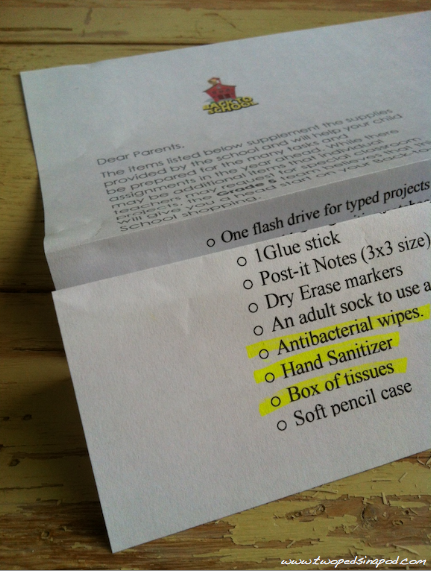Flu vaccines: what you need to know for the 2014-2015 flu season
 We gave our kids their back-to-school haircuts, donated their pants that fit like floods, and bought them new folders and notebooks. As shown on our back-to-school supply list photo, back-to-school also means the start of hand sanitizer and tissue season. Yes, it’s time for your child’s yearly flu vaccine. Even if you gave your child a flu vaccine last year, she’ll need another one this season. Not only does the flu or influenza virus (not to be confused with “the stomach bug/stomach flu”) usually come back every season in a slightly different form, but your child’s immunity has waned over the past year. With every flu season, the Centers for Disease Control comes out with new recommendations. Here is a snap shot:
We gave our kids their back-to-school haircuts, donated their pants that fit like floods, and bought them new folders and notebooks. As shown on our back-to-school supply list photo, back-to-school also means the start of hand sanitizer and tissue season. Yes, it’s time for your child’s yearly flu vaccine. Even if you gave your child a flu vaccine last year, she’ll need another one this season. Not only does the flu or influenza virus (not to be confused with “the stomach bug/stomach flu”) usually come back every season in a slightly different form, but your child’s immunity has waned over the past year. With every flu season, the Centers for Disease Control comes out with new recommendations. Here is a snap shot:
Who needs the flu vaccine?
All children aged 6 months or older, with a few exceptions discussed below, should receive a flu vaccine every year.
How many doses of flu vaccine does my child need this year?
If your child is nine years or older, your child only needs one dose this season.
If your child is younger than nine, your child only needs one dose this season UNLESS:
- This year will be the first time your child receives the flu vaccine. Then, she will need a second (booster) dose at least 4 weeks later.
- Your child skipped last year’s flu vaccine. Then, she may need a booster dose this year. Check with your child’s doctor.
Which type of flu vaccine is better, a shot or the mist (squirt in the nose)?
This year, the Centers for Disease Control suggests, if available, to give children aged 2-8 years the squirt in the nose. However, if the mist is unavailable, do not delay the vaccine. Give your child a flu shot instead. For older kids, the data is not as clear cut as to which vaccine works better to prevent the flu. Give your child either form of the vaccine.
Who cannot receive the mist?
Kids younger than 2 years; kids with certain medical conditions such as ongoing asthma (wheezing in the past year, or 2 through 4 years of age with asthma) and diabetes; kids undergoing aspirin therapy; kids who have had influenza antiviral therapy in the last 48 hours; kids with immune deficiencies; and kids around immunosupressed people who require a protective environment (e.g. around people hospitalized in a bone marrow transplant unit), should not receive the mist. These kids should receive the injectable form of flu vaccine. Your child’s doctor can provide the complete list of contraindications.
Who should NOT receive any flu vaccine?
Babies younger than 6 months old and children with severe egg allergy (anaphylaxis) should not receive the flu vaccine.
Our office is slotted to receive our annual supply of flu vaccine in the next few weeks. Our own families have learned to expect the annual flu vaccine with the start of each school year. Now we just need to convince them that they needed the haircuts.
Julie Kardos, MD and Naline Lai, MD
©2014 Two Peds in a Pod®